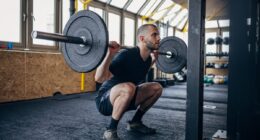
The Location, Location, Location presenter’s mother Fiona sadly passed away from breast cancer at the age of 66, and after the heartbreak of losing her mother, Allsopp was determined to do anything to minimise her own risk of the condition. Despite discovering that she and her sister Sofie have a one-in-three chance of developing breast cancer, both sisters took a different approach to minimising their risk. Sofie opted to have a mastectomy to remove her breasts reducing her risk by 90 percent. Not wanting to have the operation, Allsopp instead changed her lifestyle to try to reduce her risk of cancer as much as possible, saying that being overweight on your 50th birthday is the “number one risk factor for breast cancer”.
“I’m not mucking around or burying my head in the sand,” Allsopp stated firmly, backing her decision not to have the operation back in 2015. “I’m not doing this without medical advice.
“I have annual ultrasound scans, as well as a mammogram, which is something my doctors tell me is a perfectly safe and acceptable treatment plan.”
The star went on to explain the importance of diet to her late mother, and what she now eats in order to minimise her cancer risk as much as she possibly can.
She said: “My mother took the view that diet was incredibly important in managing cancer. She reduced her booze intake to almost zero and gave up sugar.
READ MORE: ‘I’ve been on stage… bleeding underneath my clothing’ LeAnn Rimes on her severe illness
“Notting Hill [the West London area where Allsopp lives] is rife with women my age who are hysterical about certain food types, and I just think, ‘Get over yourselves.’ But I do keep alcohol to an absolute minimum – I drink about once a month, if that – and try to avoid pre-prepared food.
“As a busy mum, I know it’s all about thinking of the easiest and healthiest ways to feed the family. So we have a Vitamix blender, which is just brilliant. This morning I made my son a smoothie with an egg from our own chickens, half an avocado, a banana and some blueberries. That’s a great start to the day.
“I think that me and my sister making different choices is a good thing.”
Having stopped eating bread and potatoes as well as having five hours between each of her meals, Allsopp lost over two stone in weight, going from a size 16 to a size 12. She also started running, something that is made easier by living in Holland Park, West London.
DON’T MISS:
After seeing the effect a mastectomy had on both her sister Sofia and her mother Fiona, Allsopp’s decision to opt out seemed wise, but back in 2015, the star didn’t rule out having the operation forever.
READ RELATED: Woman reveals she lets her friend breastfeed her baby so she can drink alcohol
Allsopp continued: “My mother wanted us all to have the surgery – she was with my sister when she had hers. But she understood why I didn’t, and our other sister Natasha hasn’t had it either.
“I have two children, two stepchildren, and a very busy job. I would have to take a big chunk of time out of my life. And Mum’s back was never the same after her operation.”
“My understanding is that genetic breast cancer tends to affect women younger than other types of cancer – I’m already ten years older than my mother was when she got it, while my cousin was only 32 when she was diagnosed,” she said back when she was only 44 years of age.
Allsopp’s risk of breast cancer is even further heightened as her late maternal grandmother also died from breast cancer, and five other female relatives have suffered from it. Due to this, doctors warned the family that their history meant there was “probably” a hereditary risk due to an unidentified mutant gene.
The NHS explains that breast cancer is the most common cancer in the UK, affecting one in eight women. About 80 percent of breast cancers are diagnosed in women aged 50 and over.
The best-known breast cancer genes are the BRCA1 and BRCA2 mutations. These can increase the risk of breast cancer to 87 percent, and of ovarian cancer to more than 50 percent. According to Cancer Research UK, researchers think that around 70 in every 100 women with a faulty BRCA1 or BRCA2 gene will develop breast cancer by the age of 80.
However, it is important to note that overall, cancers caused by faulty genes are relatively rare. Cancer Research goes on to add that most cancers develop because of a combination of chance and our environment, not because we have inherited a cancer gene fault.
It is important to note that even with intervention, breast cancer cannot be prevented altogether. However, as Allsopp correctly chose to do, making changes to your diet and exercise routine can help in keeping fit and healthy.
The NHS states that studies have looked at the link between breast cancer and diet, and although there are no definite conclusions, there are benefits for women who:
- Maintain a healthy weight
- Exercise regularly
- Have a low intake of saturated fat
- Do not drink alcohol.
Having a mastectomy like Sofie is also another way in which an individual’s breast cancer risk can be minimised. The NHS explains that an alternative to mastectomy is a nipple-sparing mastectomy, where the whole mammary gland is removed, but the skin of the breast is preserved. This is not widely available at the moment, but it’s being used more often and can achieve excellent results.
There are also three medicines available on the NHS for women who have an increased risk of breast cancer. These medicines are usually taken once a day for five years and can reduce an individual’s risk of breast cancer while they are taking them and possibly for several years afterwards.
- Tamoxifen – for women who either have or have not been through the menopause
- Anastrozole – for women who have been through the menopause
- Raloxifene – for women who have been through the menopause.
Source: Daily Express









